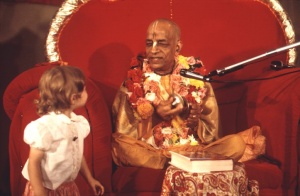CC Adi 17.53 (1975)

A.C. Bhaktivedanta Swami Prabhupada
Below is the 1996 edition text, ready to be substituted with the 1975 one using the compile form.
TEXT 53
- pāṣaṇḍī saṁhārite mora ei avatāra
- pāṣaṇḍī saṁhāri’ bhakti karimu pracāra
SYNONYMS
pāṣaṇḍī—demons, atheists; saṁhārite—to kill; mora—My; ei—this; avatāra—incarnation; pāṣaṇḍī—atheist; saṁhāri’—killing; bhakti—devotional service; karimu—I shall do; pracāra—preaching.
TRANSLATION
“I have appeared in this incarnation to kill the demons [pāṣaṇḍīs] and, after killing them, to preach the cult of devotional service.”
PURPORT
Lord Caitanya’s mission is the same as that of Lord Kṛṣṇa, which He states in the Bhagavad-gītā (BG 4.7-8):
- yadā yadā hi dharmasya
- glānir bhavati bhārata
- abhyutthānam adharmasya
- tadātmānaṁ sṛjāmy aham
- paritrāṇāya sādhūnāṁ
- vināśāya ca duṣkṛtām
- dharma-saṁsthāpanārthāya
- sambhavāmi yuge yuge
“Whenever and wherever there is a decline in religious practice, O descendant of Bharata, and a predominant rise of irreligion—at that time I descend Myself. In order to deliver the pious and to annihilate the miscreants, as well as to reestablish the principles of religion, I advent Myself millennium after millennium.” As explained here, the real purpose of an incarnation of Godhead is to kill the atheists and maintain the devotees. He does not say, like so many rascal incarnations, that atheists and devotees are on the same platform. Śrī Caitanya Mahāprabhu, or Lord Śrī Kṛṣṇa, the real Personality of Godhead, does not advocate such an idea.
Atheists are punishable, whereas devotees are to be protected. To maintain this principle is the mission of all avatāras, or incarnations. One must therefore identify an incarnation by His activities, not by popular votes or mental concoctions. Śrī Caitanya Mahāprabhu gave protection to devotees and killed many demons in the course of His preaching work. He specifically mentioned that the Māyāvādī philosophers are the greatest demons. Therefore He warned all others not to hear the Māyāvāda philosophy: māyāvādi-bhāṣya śunile haya sarva-nāśa. Simply by hearing the Māyāvāda interpretation of the śāstras, one is doomed (CC Madhya 6.169 (1975)).